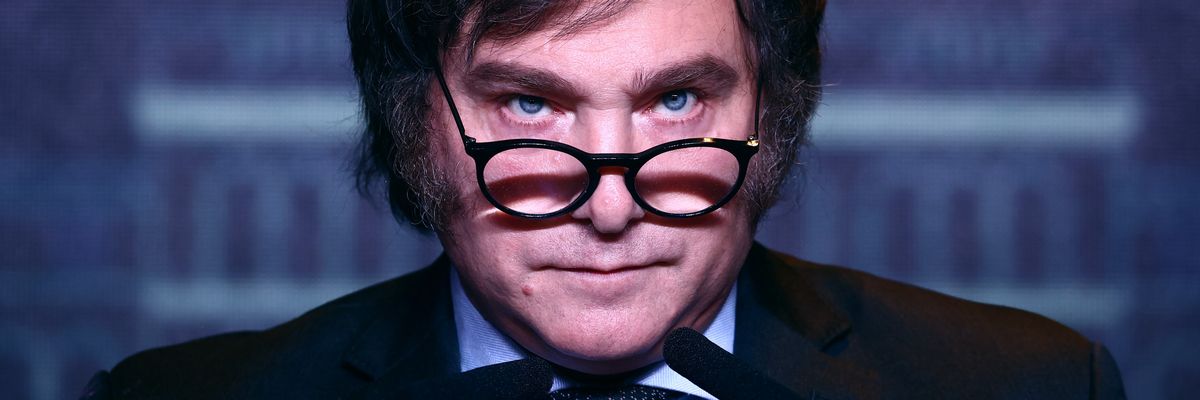As the human impact of Argentinian President Javier Milei's "shock treatment" to the South American country's economy became increasingly clear with rising prices on Thursday, Security Minister Patricia Bullrich announced what one journalist said were doubtlessly "preemptive" new controls on protests to discourage a struggling population from speaking out.
Bullrich said four security forces—the Federal Police, the Gendarmerie, the Naval Prefecture, and the Airport Security Police—will work together to stop protests that block streets and suggested the protocol is aimed only at ensuring "that people can live in peace" without demonstrators blocking traffic.
But as Progressive International co-general coordinator David Adler and others noted, the measures also include calls for armed forces to break labor strikes, create a national registry of people who organize protests, and sanctions against parents who bring their children to demonstrations.
The new package amounts to "a total crackdown on Argentine civil society," Adler said.
Bullrich's announcement came days after Milei, a far-right libertarian economist who has called the climate crisis "a socialist lie" and has been compared to former U.S. President Donald Trump, announced in the first weeks of his presidency an economic "shock treatment" package including a devaluation of the peso by 50%, from 400 pesos to the U.S. dollar to 820 pesos.
The administration also said it would cut public spending by closing some government ministries, increasing retirements ordered by decree, reducing energy and transportation subsidies, and freezing public works, with further "profound" measures expected in the future.
Milei claimed that with the spending cuts, government revenues will ultimately increase by 2.2 points, helping to confront an economic crisis in which annual inflation exceeds 160%, the country has a trade deficit of $43 billion, and $45 billion is owed to the International Monetary Fund (IMF).
But as Milei's "open heart surgery of the economy," as El País called the package, took hold, prices of some goods and services rose by 100% and some commuters worried that they will no longer to be able to afford their daily commutes it transit agencies are forced to raise prices due to lost subsidies.
"If [the bus fare] goes up, my salary will be spent on transport," Julia González, who takes three buses and a train to her job in downtown Buenos Aires, toldThe Associated Press.
About 40% of Argentinians live below the poverty line and more than 9% are destitute, reported El País, with incomes insufficient to buy food.
Economist Juan Manuel Telechea told the outlet that monthly inflation could reach 30-40% due to the devaluation and that social aid will be "highly insufficient."
Presidential spokesperson Manuel Adorni said of the economy Wednesday that Milei "found a patient in intensive care about to die," but one trade unionist told El País the president is "exaggerating the inherited crisis situation to justify inadmissible measures, which will increase poverty levels in Argentina above 50% in a matter of days."
"The mega-devaluation that is being carried out is a matter of concern because it may devolve into hyperinflation," Pato Laterra, an economist at the National University of La Plata, told the newspaper.
Mark Weisbrot, co-director of the Center for Economic and Policy Research, said last month that Argentina's current economic crisis is the result of right-wing former President Mauricio Macri's administration, which took out the largest loan ever from the IMF and pushed the economy into a recession, with poverty and inflation rising by 50% or more.
"But a crazed, economically suicidal approach would only make things worse—and as Argentina has experienced, things can get a lot worse," said Weisbrot. "Milei displays a callous disregard for most people's living standards, values, and well-being, as well as a commitment to widely discredited economic policies, that is unprecedented."
Jacob Sugarman of the Buenos Aires Heraldsaid Wednesday that it remains to be seen "how long Argentine society is willing to tolerate this kind of pain" and suggested that Bullrich's announcement of a crackdown on dissent is likely to further anger the public.
"Protest is elemental to Argentine social and political life, so it's not difficult to imagine how this ends," said Sugarman, "especially with Bullrich announcing that the government will use federal forces including the National Military Police to break picket lines."

